Eat For a Better Brain: Top Foods To Enhance Performance
Whatever your age, we all need to keep our brain in peak working condition. One of the key influencers on how we think and feel are the foods we pile on your plates.
With a weight of 1.3kg/3lb our brains are one of our heaviest organs, demanding the most oxygen and glucose. Our brain uses about 30 per cent of the body’s glucose and 20% of your daily calorie intake. It is also very nutrient dependent. For optimal function your brain requires an array of essential amino acids, omega 3 fats, phospholipids and vital vitamins and minerals to make the neurotransmitters that affect mental capacity, focus, concentration, memory and mood.
Our modern diet and lifestyle can take its toll on the brain, and it doesn’t just happen to older people either. Brain deterioration and disorders affect people of all ages – young and old. It is also evident that degeneration begins decades before symptoms become evident, and it’s our diet and lifestyle that have a profound effect on how our brain ages.
This is why I wrote the Brain Boost Diet . This diet is a revolutionary 4-week diet based on the principles of functional medicine and the latest research on brain health and cognitive decline. The programme is designed to cleanse, protect and renew your brain, unleashing its huge potential.
Following the publication of Professor Bredesen’s research paper ‘Reversal of cognitive Decline; a novel therapeutic programme’ in October 2014, it is now becoming increasingly evident that diet and lifestyle intervention can have a profound effect on brain health. In fact diseases such as Alzheimer’s – which is commonly viewed as one which cannot be treated, prevented or reversed– is far more dynamic than once thought. By addressing the underlying imbalances and triggers in the body through a functional medicine approach it is now possible to turn back the clock on the aging brain.
The Brain Boost Diet is a functional medicine approach using diet and lifestyle intervention to optimise your brain health, identifying and addressing the areas of imbalance. This programme can be used whatever your age and state of health. It can be used by those wanting to prevent cognitive decline, address conditions such as depression, low mood, memory loss or poor mental performance. It is in fact a programme that will optimise every area of health as it tackles both dietary factors and lifestyle factors that contribute to poor brain health such as poor sleep, stress, lack of exercise and a diet high in carbohydrates and sugar and other inflammatory foods. Crucially it focuses on foods that nourish the brain, key nutrients that optimise hormone and neurotransmitter levels (brain chemicals that influence how we think and feel).
There are various factors can affect brain-cell health and neurotransmitter production, including inflammation (the body’s response to harmful stimuli), blood-sugar imbalances, toxins, hormone imbalances, stress and insufficient key nutrients. These are all addressed in the Brain Boost Diet. This is what makes the programme unique – it looks at the underlying factors contributing to poor brain health and addresses each one week by week.
If you are looking to boost your mental performance here are some top foods to include
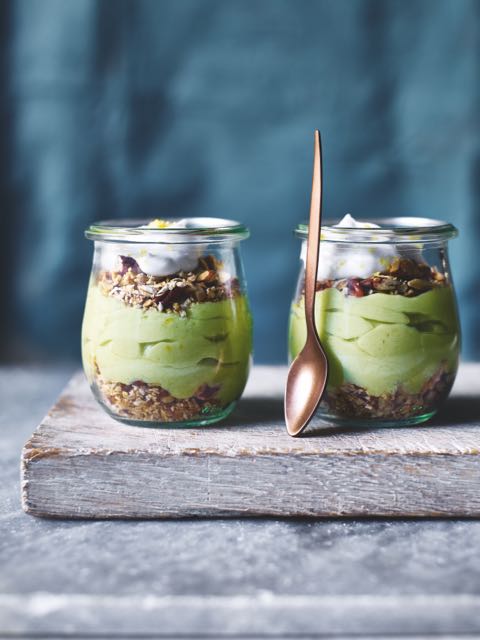
Lemon Cheesecake pots (containing avocado cream) From the Brain Boost Diet
Avocado
Known for their heart healthy fats, avocados are packed with monounsaturated fats known to lower inflammation (inflammation can disrupt levels of mood boosting neurotransmitters such as dopamine and serotonin). Avocados are packed with tyrosine, an amino acid that helps the body produce dopamine which helps increase feelings of reward and motivation. They also provide plenty of B vitamins including folate that helps reduce homocysteine, an amino acid linked to cognitive decline and depression.
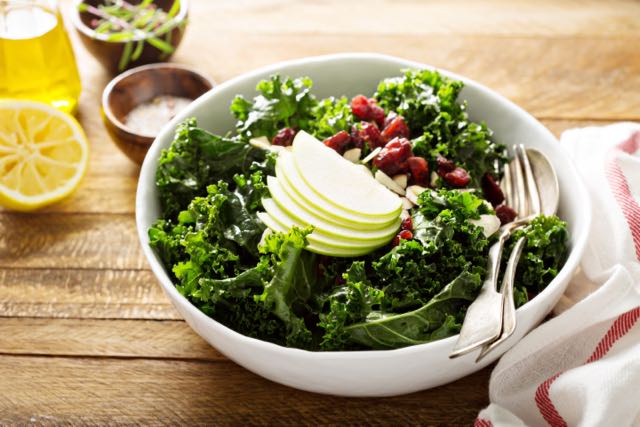
Leafy Greens
Greens including kale, spinach, broccoli and asparagus are all excellent brain foods. A good source of magnesium – a mineral which helps calm the mind and body making it particularly beneficial in times of stress. Low magnesium levels are also linked to migraines and depression. Greens are also a good source of vitamin K. This fat-soluble vitamin is essential for forming sphingolipids, a type of fat that’s densely packed into brain cells.
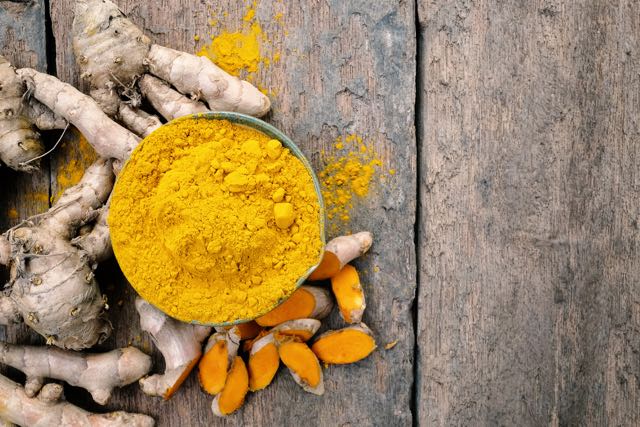
Turmeric
This deep-yellow spice is a key ingredient in curry powder and has a number of benefits for the brain. Curcumin, the active ingredient in turmeric, has been shown to cross the blood-brain barrier, meaning it can directly enter the brain and benefit the cells there. Curcumin has been shown to improve memory, delay age related cognitive decline and ease depression by boosting serotonin and dopamine which both improve mood.
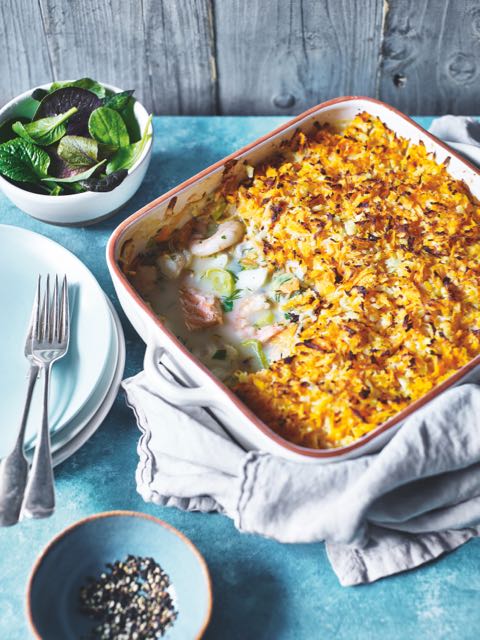
Sweet potato Gratin Fish Pie From The Brain Boost Diet
Salmon
About 60% of your brain is made of fat, and half of that fat is the omega-3 essential fats. This makes oily fish like salmon excellent brain food. Your brain uses omega-3s to build brain and nerve cells, and these fats are essential for learning and memory. Not getting enough of these essential fats is linked to learning impairments as well as low mood. Wild-caught salmon also contains plenty of lean protein required to make brain chemicals and is rich in vitamin B12 which has been shown to reduce feelings of depression.
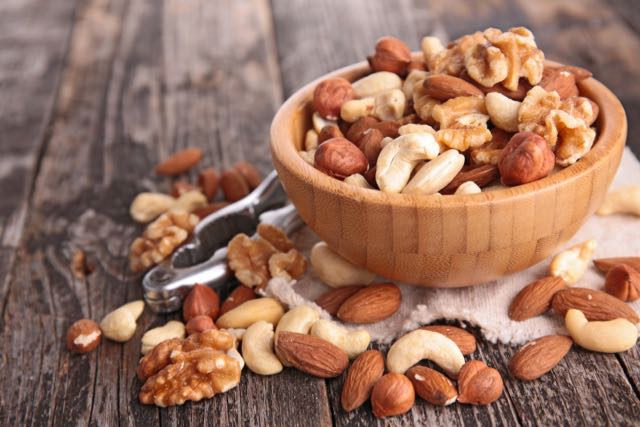
Nuts
Nuts contain an array of brain healthy nutrients including healthy fats, antioxidants and vitamin E. Vitamin E shields cell membranes from free radical damage, helping slow mental decline. A 2014 review showed that nuts can improve cognition and even help prevent neurodegenerative diseases. While all nuts are good for your brain, walnuts may have an extra edge, since they are also rich in omega-3 fatty acids.
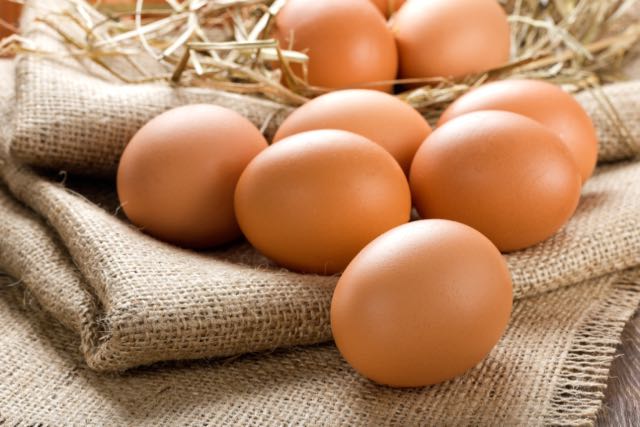
Eggs
The protein in eggs, particularly the yolks can significantly boost your blood plasma levels of tryptophan and tyrosine – the building blocks to mood neurotransmitters. They also contain choline and omega-3 fatty acids, which can improve memory too.
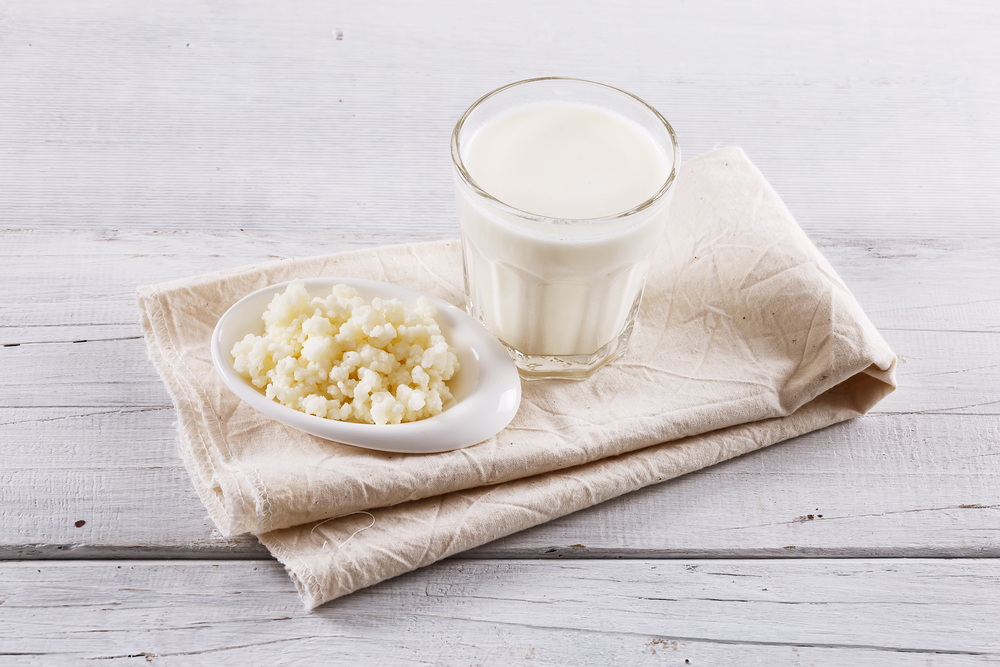
Yogurt and Kefir
Probiotic rich foods like yogurt and kefir are a must for a healthy brain. Packed with beneficial bacteria researchers have found probiotics can help fight depression and anxiety. It is thought that bacteria may decrease inflammation in the body and increase levels of tryptophan.
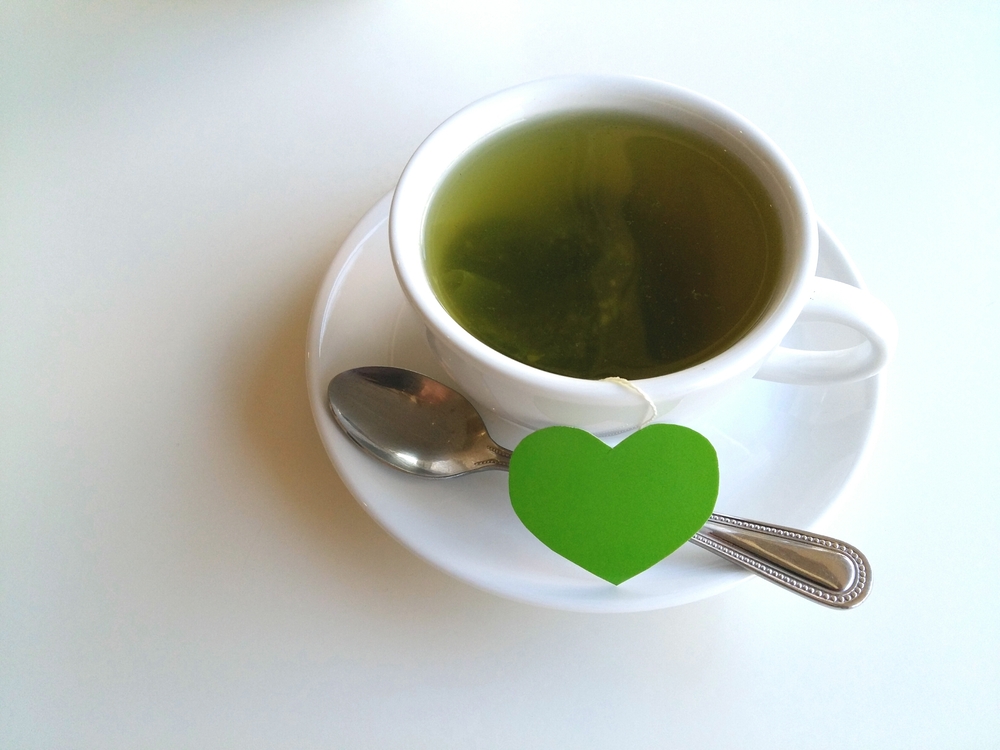
Green Tea
Green tea is a popular health drink and studies suggest it can improve alertness, performance, focus and concentration. Green tea contains L-theanine, an amino acid that can cross the blood-brain barrier and increase the activity of the neurotransmitter GABA, which helps reduce anxiety and makes you feel more relaxed. It’s also high in brain protective antioxidants.

Dark Chocolate
Another reason to eat a little chocolate – just make sure it’s the dark variety. There are over 300 naturally-occurring chemicals in chocolate, and some of them can affect the human brain via the release of particular neurotransmitters which affect how we think and feel. For example, phenylethylamine is sometimes called “the love drug”, because it arouses feelings similar to those that occur when one is in love. Another chemical found in chocolate known as tryptophan causes the release of the feel good neurotransmitter serotonin.
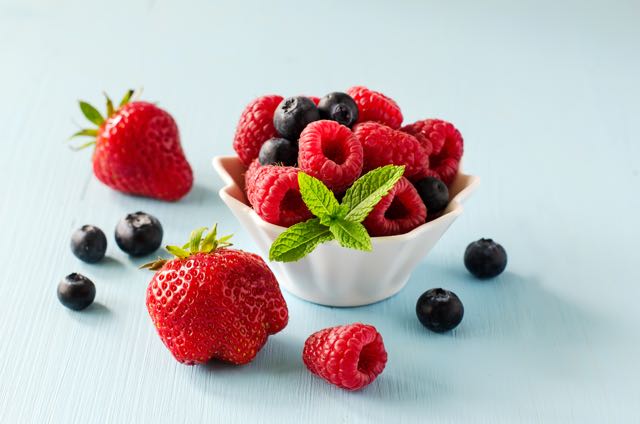
Berries
Berries are loaded with antioxidants including anthocyanidins, known to boost brain function and promote brain and nervous system health. These antioxidants act against both oxidative stress and inflammation, conditions that may contribute to brain aging and neurodegenerative diseases. In fact, animal studies have shown that blueberries help improve memory and may even delay short-term memory loss.
Remember that there are also many lifestyle factors that play a role including stress management, sleep, exercise and getting sufficient sunlight and vitamin D. Pre-order the Brain Boost Diet here.

